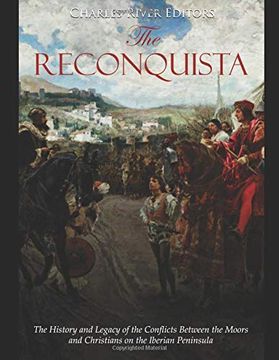The Reconquista: The History and Legacy of the Conflicts Between the Moors and Christians on the Iberian Peninsula (en Inglés)
Reseña del libro "The Reconquista: The History and Legacy of the Conflicts Between the Moors and Christians on the Iberian Peninsula (en Inglés)"
*Includes pictures*Includes medieval accounts*Includes online resources and a bibliography for further readingThe term “Reconquista” is a Spanish word transferred to the English language to represent the nearly 800 years in which the Moors and Christians struggled against one another for control of the Iberian Peninsula. Although the phrase typically refers to the time when the numerous Christian kingdoms mobilized to overthrow the Islamic Caliphates set up in the peninsula, the term can additionally be used to refer to the entire situation starting in the 8th century, when Islamic civilization slowly moved out of North Africa, across the Mediterranean Sea, and into southern Iberia. Not surprisingly, three religions attempting to coexist during medieval times resulted in nearly incessant conflicts, marked by high taxation, disparate societies, rigid cultural controls, and systemic violence. Despite the odds, these three religions managed to live in a state of quasi-acceptance and peace in most of the major cities like Cordoba and Toledo, with sporadic warfare occurring on the borders between Al-Andalus and the Christian kingdoms near the Pyrenees Mountains. Muslims, Christians, and Jews would attempt to reorganize their societies several times over the centuries through warfare, always with Jews on the lower rungs and Christians and Muslims fighting it out above them. Though it’s often forgotten today, the fighting that took place during the Reconquista was not originally driven by religion. Instead, the majority of the battles were fought by ambitious rulers who sought territorial expansion, like many other civilizations during the Middle Ages. In fact, the Reconquista would not gain its unique religious flavor until the 13th century, when the territories that would become Castile and Aragon drummed up religious fervor to achieve its aims and gained papal support from Rome.After the Reconquista officially ended, the anger, bitterness, and resentment fostered by the fighting resulted in further warfare as the newly created Christian kingdoms of Spain and Portugal continued their fight by chasing after and conquering Muslim territories and civilizations in Africa. Another byproduct of the Reconquista was the notorious Spanish Inquisition, and Ferdinand and Isabella’s choice to expel the Jews had dire consequences not only for the Jewish population but for Spain as well. The country’s economy suffered after the expulsion, as the country lost many skilled craftsmen, money lenders and bankers, a critical part of their economy. Meanwhile, the Jews who took refuge in Turkey were welcomed by the Ottoman Sultan and put to work making weapons to use against Europe. The famous Renaissance political philosopher Niccolo Machiavelli later cited the expulsion of the Jews as an act of “pious cruelty”. For many years afterward, the very same people of Castile who had perpetrated the anti-Semitism blamed the expulsion of the Jews for many of their troubles.The legacy of the Reconquista has reverberated throughout the peninsula ever since, resulting in a diverse culture, continued religious tensions, and historical accounts and legends about glorious warfare, brutal torture, and the formation of devoutly religious states that lasted until the 20th century.The Reconquista: The History and Legacy of the Conflicts Between the Moors and Christians on the Iberian Peninsula examines the events that shaped the modern history of Spain and Portugal, and the ramifications. Along with pictures of important people, places, and events, you will learn about the Reconquista like never before.

